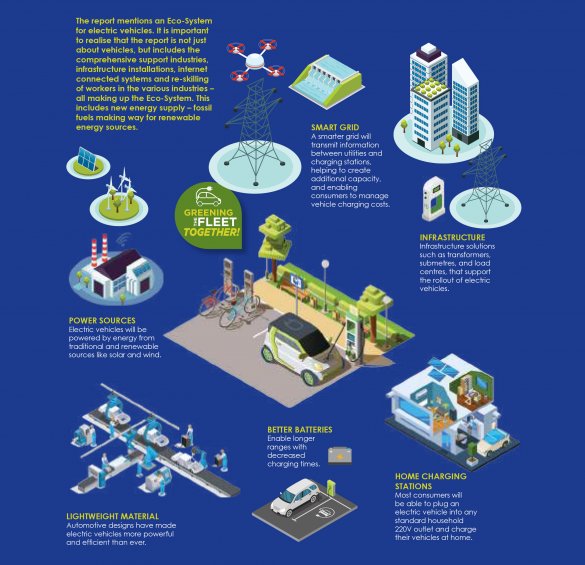The global response to climate change is accelerating, and leading countries have made challenging commitments towards reducing carbon emissions and becoming carbon neutral. These range from converting all government vehicles to electric vehicles, to banning internal combustion engine (ICE) vehicles from cities. Simultaneously, the automotive industry is going through a historic transformation, not only with the transition towards electric vehicles, but also the development of the connected vehicle. The connected vehicle focuses on the development of advanced onboard systems, which range from infotainment to autonomous vehicles.
It is expected that original equipment manufacturers will become some of the largest technology companies in the world.
The connected vehicle will not only fundamentally change the automotive industry, but also vehicle use and the complete mobility landscape. This landscape, which has already seen fundamental change through ridesharing, is expected to go through even more significant transformation.
South Africa is currently in the early stages of transitioning with few electric vehicles in operation.
A green paper recently published with the objective of setting guidelines and creating a framework for protecting the motoring industry shows that this is currently a significant part of the South African economy, not only from the perspective of job creation, but also earning foreign revenue.
A framework for the creation of an Electric Vehicle Eco-System in South Africa is envisaged.
Alternative potential scenarios were formulated for South Africa based on many fundamental drivers ranging from the active role that government will play in the creation of a charging grid with national coverage providing convenient, low-risk charging options for owners of electric vehicles. These scenarios identified high-, medium- and low-road scenarios.
The objective with the formulation of these scenarios was to create a framework for the formulation of an electric vehicle implementation plan for GMT.
The Western Cape Government has set vision-inspired goals for economic growth, job creation, and a better life for all citizens. The objective of the Electric Vehicle Strategy is broader than just converting ICE vehicles to electric vehicles, but also supporting these vision-inspired goals through focusing on broader socioeconomic objectives.
GMT has set itself a Massive Transformative Purpose (MTP) of Innovative mobility solutions to co-create a better life for all.
This is in line with the MTP of the Western Cape Mobility Department of Enabled communities leading dignified lives. The Electric Vehicle Strategy is developed as a key mechanism towards achieving these goals.
The core focus of the Electric Vehicle Strategy is the development of an Electric Vehicle Eco-System in the Western Cape.
This Eco-System not only focuses on conversion to electric vehicles, but also the creation of an electric vehicle industry in support of the broader socio-economic objectives.
A key cornerstone of the Electric Vehicle Strategy is for the Western Cape Government to play a leading role by setting a strategic plan that would provide the basis for collaboration between various departments, OEMs, and the broader industry. Key development projects are recommended for implementation to progress with the creation of the critical building blocks for the creation of the Eco-System. These projects are:
- The testing and placement of BMW i3 vehicles already purchased.
- The development of a provincial electric vehicle charging network.
- Collaboration with OEMs for the re-alignment of vehicle procurement to support market penetration targets.
- Testing of locally manufactured electric vehicles.
- Research and development projects for the conversion of existing vehicles to electric vehicles.
- Research and development to determine feasibility of battery recycling and repurposing.
- The development of a technology management platform for managing connected electric vehicles.
The completion of these projects through collaboration with various stakeholders would provide the foundation for the creation of an Electric Vehicle Eco-System in the Western Cape to facilitate the transition to electric vehicles, stimulate economic growth, contribute to job creation, and achieve the broader vision inspired goals of the Western Cape.
The five-year implementation plan is divided into three phases:
- A foundation phase of 12 months would provide the foundation for the implementation of the strategy. Aspects that would be addressed in the foundation phase include commencement with the identified projects and completing the negotiations for the collaborative partnerships with various stakeholders.
- The second phase, or development phase, of 24 months focuses on the completion of identified projects and preparing for commercialisation of these projects.
- The realisation phase of a further 24 months is intended to focus on the commercialisation of the projects towards creating an electric vehicle industry in the Western Cape.

